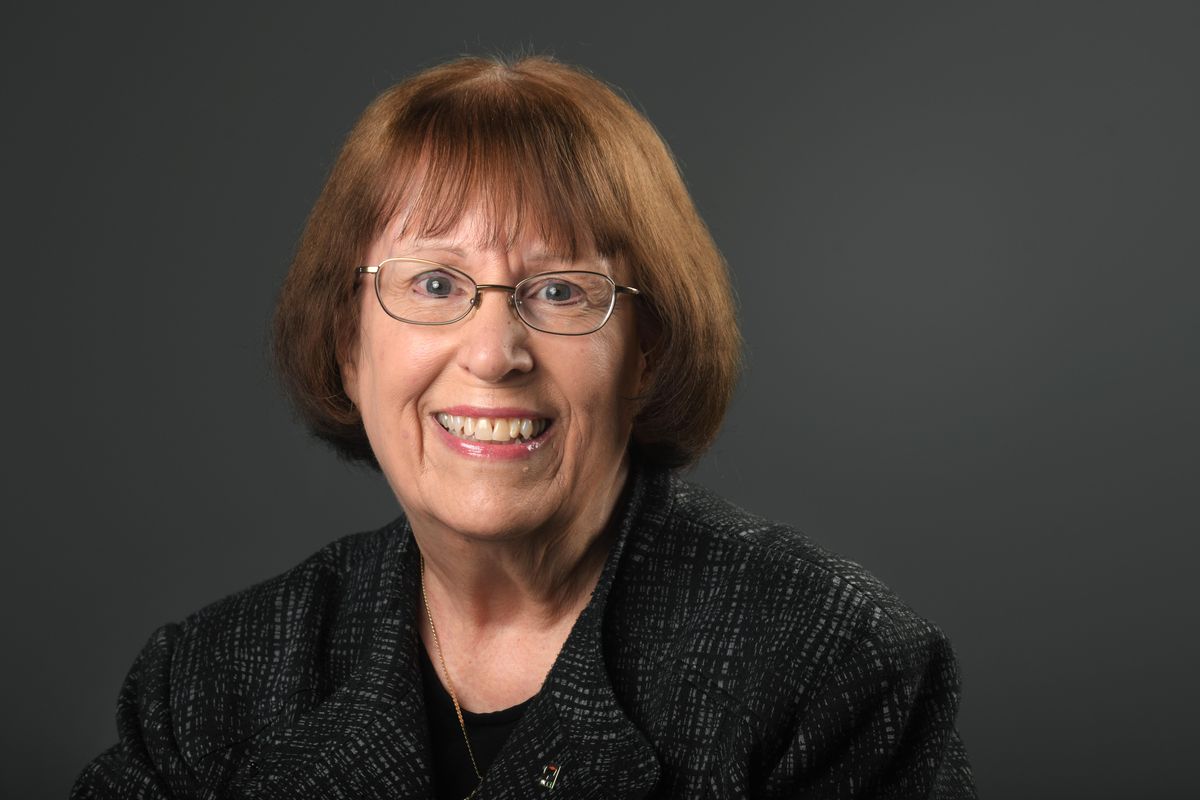Women of the Year: For Pam Senske, Pearson Packaging is about family and community

When Pam Senske was 8 years old, she was already learning about the family business from her father, R.A. “Lefty” Pearson, founder of Pearson Packaging Systems.
During summer breaks from Washington State University, Senske worked at the manufacturing facility, picking up parts at industrial supply stores, copying blueprints and assisting the company’s accountant with bookkeeping.
“I became familiar with the different kinds of things they did on a daily basis,” she said. “That was really fun, and I was really interested in the business.”
But it would be a few years before she returned to the family business. She moved with her husband to Cincinnati, where she worked in mental health. When they returned to Spokane, she worked raising her two sons. Then in 1986, Senske joined the company full time, holding administrative and human resources positions before taking the helm as president and CEO in 1992.
Under Senske’s direction, Pearson Packaging Systems developed a capital expenditures plan to improve profitability and integrated computers to streamline production and control inventory.
“I just really felt the responsibility to do something when the company seemed to be struggling,” she said. “I felt a responsibility that you can’t just give up without trying. If you fail, you can at least say, ‘Well, I did everything I could.’ I really had that sense it was important to do that. (The company) was kind of a family legacy.”
Pearson Packaging Systems builds machines that form, pack, seal and palletize boxes for companies such as Dell, Procter & Gamble, and Coca-Cola. The company has distributed more than 20,000 machines worldwide.
Pearson founded the company in 1955 as R.A. Packaging Co. He had worked for Bohemian Brewery, which handmade six-pack containers and cases. That led Pearson to invent an automated six-pack case erector in his garage. His invention was adopted across the country and in Europe.
After Pearson died in 1971, the family retained ownership of Pearson Packaging Systems. Senske’s mother, Alma, worked at the facility amid changes in the company’s leadership.
Although the company was growing at the time, customers weren’t getting parts on schedule because of an outdated system, Senske said.
“I had said to my mom, ‘I’m just going to come out there. I just want to talk to the managers of each department, just to get a sense of who they are, what’s going on and their suggestions,’ ” she said. “So I did that and it was really interesting. I expected to maybe be there for two or three months. Well, it turned out being 30 years.”
Senske was part of a 13-person team that studied and applied a system called manufacturing resource planning, which set the framework for the company’s current lean manufacturing practices.
“When she went out there, things started picking up and it was a totally different company,” said Don Pearson, Senske’s brother. “Integrity, work ethic, fairness and intelligence – she had all those things, and that’s what made it work.”
Senske said when she took over the company, most of the managerial positions were held by men. Some employees were surprised to see a woman assume the role of CEO, but they supported her because they wanted the company to be successful.
“I went out there with an attitude of, ‘I just want to understand what you think and how you think things ought to be done and get people involved in decision-making,’ instead of having (the company) just handed down,” she said. “And, you know, it went really well. People could not have been nicer and more supportive.”
Now, women hold half of the company’s leadership positions.
“It is changing in terms of women in the business,” Senske said, referring to the manufacturing industry. “And there are other women who are in charge of packaging and machinery businesses.”
Don Pearson said his sister earned the respect and admiration of employees with her positive attitude and exemplary leadership skills.
“Because of her efforts, we still have the company,” he said. “It’s everything to this family, but it also carries on a legacy.”
Pearson noted his sister also dedicated time to charities and community organizations, such as the Girl Scouts of America, the YWCA, Mobius Science Center, Second Harvest food bank and the Early Life Speech & Language program. She is also a former board member of Greater Spokane Incorporated.
When the choice to sell or continue the family business arose in 1997, Senske asked her son, Michael, if he was interested in leading the company. He assumed the role of president and CEO in 2003.
Senske said his mother valued the company’s employees and demonstrated that by implementing a comprehensive benefits package to ensure work-life balance.
“I think she really, sincerely cared for and respected the employees. She established a culture of appreciating the contributions of employees and putting people first over the needs of the company,” he said. “The best thing about her is she’s never been in it for herself. She’s done a phenomenal job at Pearson and in the community.”
Pearson Packaging Systems – now a thriving company – generates more than $100 million in annual revenue with more than 300 employees.
Senske, although retired, remains chairman of the company’s board of directors.
“Would I do it again? I’d have to say yes,” Senske said, referring to leading the company. “I think there are things I could have done better, but it has been interesting, it has been exciting and it has been rewarding.”